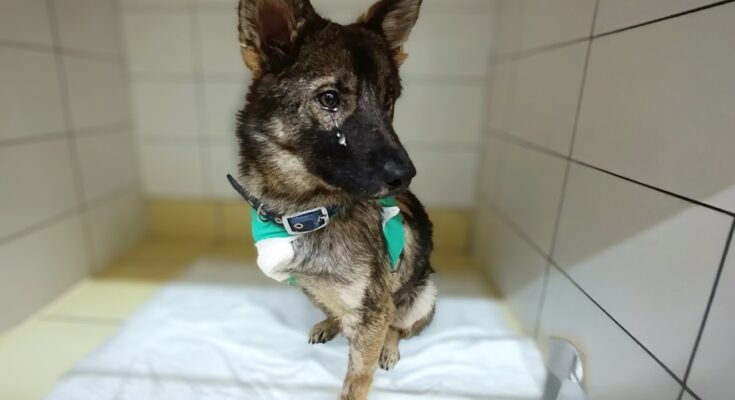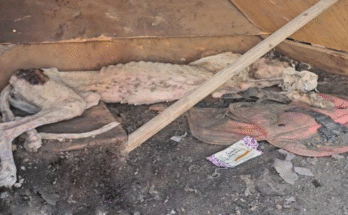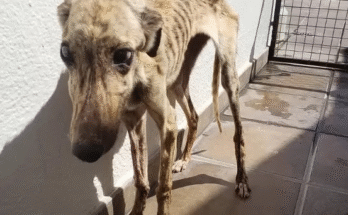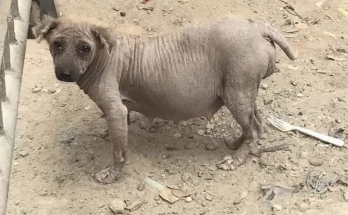In a small village nestled between rolling hills and sunbaked fields, lived a three-legged dog named Lucky. His name, once full of promise, had become a cruel irony. Lucky had once been a sprightly pup—bounding through the fields, tail wagging, his eyes filled with joy and wonder. But a tragic accident changed everything. He had been hit by a motorbike while chasing after a ball, and though he survived, his front leg had to be amputated.
At first, his owner, Mr. Van, had been sympathetic. He built a small ramp for Lucky to climb into the house and even carried him around for the first few days. But sympathy faded. Over time, Lucky’s limp became a reminder of inconvenience, a burden. The ramp broke and was never fixed. Walks became less frequent. And soon, Lucky found himself alone in the yard, ignored, unwanted.

Day after day, Lucky lay under a tree, watching as the world moved on without him. He cried sometimes—soft, heartbreaking whimpers that went unheard. His eyes followed Mr. Van whenever he passed by, hoping, pleading. A single glance, a kind word, anything would have filled Lucky’s heart. But there was nothing.
Neighbors began to notice. Mrs. Chenda, who lived two houses down, often saw Lucky curled into a tight ball at night, trembling from the cold. “Poor dog,” she whispered once to her husband. “All he wants is love.” But people in the village rarely intervened in the affairs of others. They just watched and murmured.
One hot afternoon, a group of children rode past on bicycles. Lucky, ever hopeful, limped forward, tail wagging. He let out a bark—not one of warning, but of joy. The children stopped, but instead of petting him, they pointed and laughed. “Look! A broken dog!” one of them shouted. Another threw a pebble that bounced off Lucky’s back. Startled and hurt, he retreated, his spirit a little more shattered.

That night, a heavy rainstorm rolled in. Lightning split the sky, thunder shook the ground. Lucky had no shelter but a cracked plastic container he crawled under. He cried again—not from pain, but from sheer loneliness. He had given his whole heart to humans, and now all he had was emptiness.
But fate, as cruel as it had been, still had one more chapter for Lucky.
The following morning, a woman named Dara came to the village. She worked with a local rescue group, delivering supplies and checking on stray animals. She was visiting a nearby shelter when she passed Mr. Van’s house and saw Lucky huddled under a bush, soaked, shivering, and barely lifting his head.
Her heart clenched.
She stopped her motorcycle and walked toward him slowly. Lucky looked up, expecting another stone or mocking laughter. Instead, Dara knelt and extended her hand. “Hey there, sweetheart,” she whispered. “What happened to you?”

For a moment, Lucky didn’t move. Then, ever so gently, he crawled forward and rested his head on her knee. Dara could feel his bones through his fur. He was malnourished, and scars covered his thin frame. But what broke her most was the look in his eyes—so full of sorrow and silent pleading.
Mr. Van came out, arms crossed. “That dog? You can take him. He’s useless now. Eats but does nothing.”
Dara felt fury rise in her throat, but she swallowed it. Lucky had suffered enough; anger wouldn’t help him. She simply nodded, wrapped him in a towel, and carried him to her vehicle.
At the rescue center, Lucky received a warm bath, nutritious food, and proper medical care. The vet said it would take time for him to regain his strength, but he was resilient. Most of all, he needed emotional healing.
And so began Lucky’s second chance.
For days, he barely moved. He would flinch at sudden noises and cower whenever someone approached too fast. But Dara never gave up. She sat beside him every evening, reading softly or humming lullabies. She would gently pet his head and whisper, “You are loved now. You’re safe.”
The transformation was slow, but it came.

One morning, Lucky lifted his head, tail wagging as Dara entered the room. He stood—still awkward on three legs, but stronger—and limped toward her. It was the first time she saw a spark in his eyes. He licked her hand, as if to say, “Thank you.”
Soon, Lucky began interacting with the other dogs. He learned to play again, to trust. He even took short walks with a harness, tail held high, proudly showing off his resilience. Visitors to the shelter were drawn to him—not because of pity, but because of the hope he radiated. His story was written in every scar, every careful step, every wag of his tail.
One day, a young couple named Mai and Rith came to the shelter looking to adopt. They had read about Lucky online and asked to meet him. When they entered his pen, Lucky approached slowly, sniffing their hands. He sat beside them, calm, content. Mai’s eyes filled with tears. “He’s perfect,” she said.
A week later, Lucky left the shelter with a new name tag, a new home, and a new family. His life had been one of abandonment and pain, but now it was filled with warmth, love, and healing.
Mr. Van never asked what happened to Lucky. But the villagers who had once turned away began to whisper a different story now—a story of a three-legged dog who had cried for help, and finally, someone had answered.
And as for Lucky, he never stopped being grateful. Every night, as he curled beside his new family on the couch, he would sigh deeply and close his eyes, finally knowing what it meant to be loved—not for being perfect, but simply for being himself.



